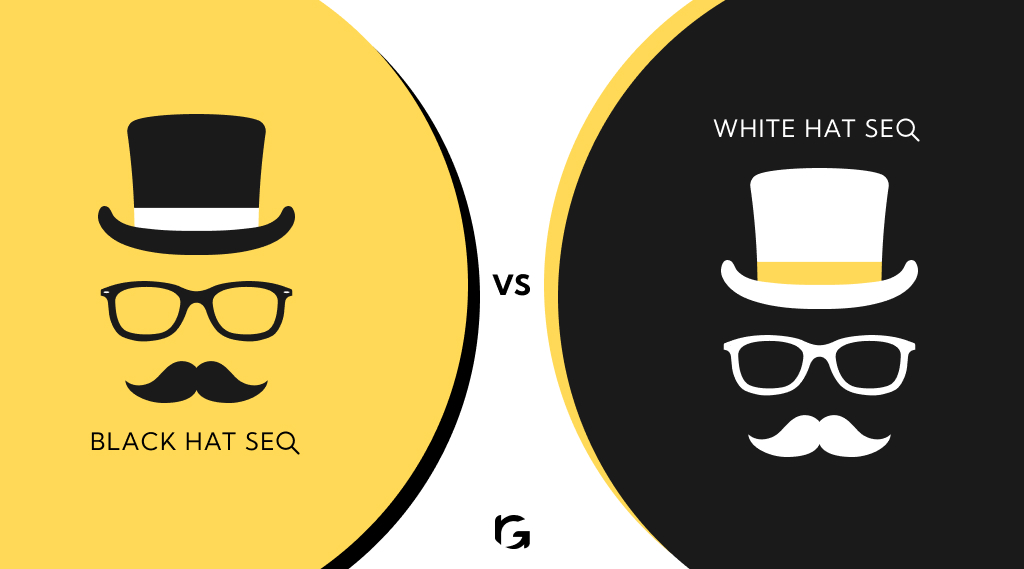What is white hat SEO?
White hat SEO refers to ethical practices used to improve a website’s search engine ranking.
It involves following search engine guidelines and focusing on providing valuable content and a positive user experience. Techniques include keyword research, creating quality content, optimizing website structure, and earning backlinks from reputable sources.
Unlike black hat SEO tactics that try to manipulate search engine algorithms, white hat SEO aims for long-term, sustainable results. By adhering to white hat methods, websites can attract organic traffic and build credibility with both users and search engines.
What is black hat SEO?
Black hat SEO refers to unethical techniques used to manipulate search engine rankings and deceive users. These practices violate search engine guidelines and often result in penalties or bans.
Examples include keyword stuffing, cloaking, hidden text, and buying links. Black hat SEO aims for quick gains in search engine visibility, but it comes with risks and can harm a website’s reputation and credibility.
Unlike white hat SEO, which focuses on providing valuable content and a positive user experience, black hat tactics prioritize gaming search algorithms. In the long run, black hat SEO can lead to significant setbacks and damage to a website’s online presence.
White hat vs. black hat SEO: Understanding the key differences
Search Engine Optimization (SEO) is crucial for businesses aiming to improve their online visibility and attract more organic traffic. However, not all SEO strategies are created equal. There are two main approaches to SEO: White Hat and Black Hat. Each approach has its own set of techniques and ethical considerations. In this guide, we’ll explore the 10 key differences between White Hat and Black Hat SEO:
| Difference | White Hat | Black Hat |
| Ethical practices | White Hat SEO focuses on employing ethical and sustainable techniques to improve search engine rankings. These techniques adhere to search engine guidelines and prioritize providing value to users. | Black Hat SEO relies on unethical tactics to manipulate search engine rankings. These techniques often violate search engine guidelines and prioritize quick gains over long-term sustainability. |
| Long-term vs. short-term results | White Hat SEO strategies aim for sustainable, long-term results. By focusing on quality content, user experience, and legitimate optimization techniques, websites can gradually build authority and improve their rankings over time. | Black Hat SEO tactics are typically geared towards achieving quick, short-term results. While these techniques may yield temporary boosts in rankings, they often result in penalties from search engines and can cause long-term damage to a website’s reputation. |
| Content quality | Content quality is a priority in White Hat SEO. Emphasis is placed on creating valuable, relevant, and original content that addresses the needs and interests of the target audience. | Black Hat SEO may involve creating low-quality or duplicate content stuffed with keywords to artificially boost rankings. This content is often irrelevant or of little value to users. |
| Keyword usage | White Hat SEO utilizes keywords strategically and naturally within content to improve relevance and readability. Keyword research is conducted to identify relevant terms that align with user intent. | Black Hat SEO may involve keyword stuffing, where keywords are unnaturally inserted into content in high densities to manipulate search engine algorithms. This practice can result in a poor user experience and penalties from search engines. |
| Link building | White Hat SEO emphasizes earning links from reputable and relevant websites through high-quality content, outreach, and relationship-building efforts. The focus is on natural link acquisition that adds value to the user. | Black Hat SEO may involve buying links, participating in link schemes, or engaging in link farming to artificially inflate the number of backlinks pointing to a website. These tactics violate search engine guidelines and can lead to penalties. |
| User experience | User experience is paramount in White Hat SEO. Websites are optimized for usability, speed, and mobile-friendliness to enhance the overall experience for visitors. | Black Hat SEO may prioritize tactics that compromise user experience, such as hidden text, cloaking, or intrusive pop-ups, in an attempt to manipulate search rankings. |
| Transparency | White Hat SEO practices are transparent and openly disclosed. Website owners and SEO practitioners are forthcoming about the strategies employed to improve search rankings. | Black Hat SEO techniques are often secretive and hidden from users and search engines. Practitioners may attempt to deceive search engine algorithms without disclosing their methods. |
| Risk of penalties | White Hat SEO carries minimal risk of penalties from search engines since it aligns with their guidelines and best practices. | Black Hat SEO poses a high risk of penalties, including manual actions or algorithmic penalties, which can result in a significant drop in search rankings or even removal from search engine results altogether. |
| Authority building | White Hat SEO focuses on building website authority through legitimate means, such as creating valuable content, earning backlinks from authoritative sources, and engaging with the online community. | Black Hat SEO poses a high risk of penalties, including manual actions or algorithmic penalties, which can result in a significant drop in search rankings or even removal from search engine results altogether. |
| Sustainability | White Hat SEO is sustainable in the long run, as it relies on ethical practices that prioritize the needs of users and adhere to search engine guidelines. | Black Hat SEO is not sustainable and carries inherent risks. The short-term gains achieved through unethical tactics are often outweighed by the potential consequences of penalties and loss of reputation. |
Is black hat SEO ever worth it?
Black hat SEO may seem tempting for achieving quick results, but it’s a risky and short-sighted strategy. Here’s why:
1. Temporary success: Black hat techniques can sometimes lead to a sudden increase in website visibility and traffic. However, these gains are often short-lived and can be followed by severe penalties from search engines.
2. Damage to reputation: Engaging in black hat SEO practices can tarnish a website’s reputation and credibility. Users may lose trust in the site if they discover manipulative tactics like keyword stuffing or hidden text.
3. Long-term consequences: Search engines continually update their algorithms to penalize black hat techniques. Once caught, a website can face harsh penalties, including removal from search engine results altogether. Reversing these penalties and rebuilding trust with search engines and users can be a lengthy and challenging process.
4. Legal ramifications: Some black hat tactics, such as content scraping or copyright infringement, can lead to legal issues and lawsuits. Violating intellectual property rights or plagiarizing content can result in costly legal consequences for businesses.
5. Ethical concerns: Black hat SEO goes against the principles of fair competition and integrity. It involves deceiving search engines and users, which can damage the integrity of the online ecosystem.
What are black hat SEO penalties?
Black hat SEO tactics are strategies used to artificially boost a website’s search engine rankings in ways that violate search engine guidelines. These tactics prioritize quick results over long-term sustainability and often involve deceptive practices. Some common black hat SEO techniques include:
1. Keyword stuffing: Keyword stuffing involves excessively using keywords unnaturally within content, meta tags, or URLs to manipulate search engine rankings.
2. Cloaking: cloaking is a technique where different content is presented to search engines and users, tricking search engines into ranking the page higher than it deserves.
3. Paid links: Buying or exchanging links solely for the purpose of improving search engine rankings violates search engine guidelines.
4. Hidden text and links: Hiding text or links within a webpage, often by making them the same color as the background or placing them off-screen, is a black hat tactic aimed at manipulating search engine algorithms.
5. Doorway pages: Doorway pages are low-quality web pages created specifically to rank for particular keywords and then redirect users to another page.
Consequences of Black Hat SEO
Engaging in black hat SEO practices can lead to various penalties imposed by search engines, including:
1. Lower rankings: Search engines may penalize websites by lowering their rankings or removing them entirely from search results pages.
2. Delisting: In severe cases, a website may be completely removed from a search engine’s index, making it virtually invisible to users.
3. Loss of trust: Black hat tactics can damage a website’s credibility and trustworthiness among users, leading to decreased traffic and conversions.
4. Manual actions: Search engines may issue manual penalties, requiring website owners to rectify the violations before their rankings are restored.
5. Algorithmic penalties :Some penalties are algorithmically applied, meaning they are automatically triggered by updates to search engine algorithms.
How to avoid black hat SEO penalties?
To avoid black hat SEO penalties and maintain a healthy online presence, it’s essential to adhere to white hat SEO practices:
1. Focus on quality content
Make sure the stuff you put on your website is really good and helpful for the people who visit. When you write or make things, try to include words that people might search for on the internet. But don’t force it; just make sure it fits naturally.
2. Follow search engine guidelines
Keep an eye on the rules that search engines like Google give out. They change sometimes, so it’s important to stay updated. Try to do things the way they suggest so your website can be found more easily.
3. Build natural links
Try to get other websites to link to yours because it shows search engines that your website is trustworthy. You can do this by making friends in your field, writing guest posts, or sharing your content on social media.
4. Optimize responsively
Make sure your website looks good and works well no matter what device someone is using, like a computer, phone, or tablet. This makes it easier for people to use your site and helps with search engine rankings.
5. Monitor and audit regularly
Keep an eye on how your website is doing over time. Check things like how many people are visiting, where they’re coming from, and if there are any problems on your site. Fix any issues you find quickly so your website stays healthy and doesn’t get in trouble with search engines.
Let’s wrap up
White hat SEO techniques prioritize ethical practices to improve a website’s search engine ranking. By focusing on quality content, following search engine guidelines, and engaging in genuine link-building efforts, websites can achieve sustainable growth and credibility online. Conversely, black hat SEO tactics offer short-term gains but come with significant risks, including penalties, loss of trust, and damage to reputation.
FAQs
Q: What are some examples of Black Hat SEO techniques?
Keyword stuffing, cloaking, buying links, hidden text, and doorway pages are examples of Black Hat SEO tactics that violate search engine guidelines.
Q: Can black hat SEO improve rankings quickly?
Yes, Black Hat techniques can sometimes yield quick improvements in rankings. However, these gains are often short-lived and can result in severe penalties once discovered by search engines.
Q: Is White Hat SEO slower than black hat SEO in delivering results?
White Hat SEO typically takes longer to show results compared to Black Hat tactics. However, the results are more sustainable and less likely to result in penalties.
Q: Does black hat SEO always lead to penalties?
While not all Black Hat tactics immediately result in penalties, they pose a significant risk. Search engines continually update their algorithms to detect and penalize such practices.
Q: Can a website recover from Black Hat SEO penalties?
Yes, it’s possible for a website to recover from penalties imposed due to Black Hat SEO. However, the process can be time-consuming and challenging, requiring a complete overhaul of the website’s SEO strategies.
Q: How does white hat SEO benefit a website in the long term?
White Hat SEO builds a strong foundation for sustainable growth by focusing on high-quality content, user experience, and ethical practices. It helps establish trust with both users and search engines, leading to long-term success.
Q: Which SEO approach is recommended for businesses?
For businesses aiming for long-term success and sustainability, White Hat SEO is always the recommended approach. While it may take more time and effort, it ensures credibility, trust, and lasting results without risking penalties from search engines.



